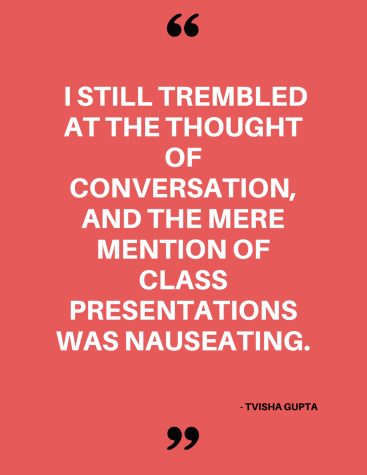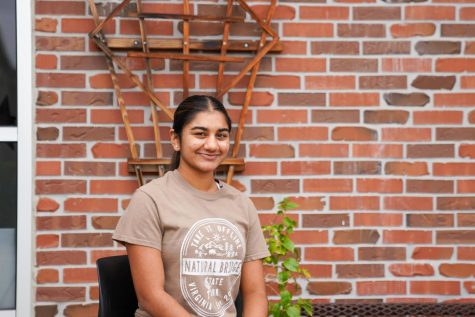“Th”peaking my mind
Learning to overcome my fear of speech
The “th” sound that I pronounced was something that I was made to feel insecure about.
March 18, 2022
My mind was racing, wheeling from all the remarks being formed in it, and my brain begged me to spit out the words bouncing off every wall of my head. The graded classroom discussion I was involved in was wrapping up, and I desperately needed to make a contribution in order to avoid receiving a low score.
But I couldn’t bring myself to form the words because I knew they wouldn’t sound right. So I stayed silent.
Ever since I got my braces off during the second week of seventh grade, I had become increasingly aware that there was “th”omething wrong with the the way I “th”poke. No matter the circumstance, people were quick to point out that I pronounced my “s” sounds as “th,” and the first remark out of other people’s mouths was often, “You’ve got a lisp!”
At first, I hadn’t considered my lisp an issue, as my doctors had told me to accept it as a part of my dental journey. However, snarky comments about my flubbed speech were frequent, and I soon found myself with the unfortunate label of “lisp girl.” I was constantly spoken over during conversations and my opinions went unacknowledged, and I realized that my lisp was anything but harmless.
People began to care more about how I said things instead of what I said, and my points and contributions to any discussion were seen as unimportant as they were ignored simply because they weren’t conveyed in a way that others found acceptable. I wasn’t able to enunciate words that echoed across rooms and commanded everyone’s attention, so I made silence my norm. A simmering, resentful fear of speaking settled within me, and in order to rid myself of my label as the “lisp girl,” I remained quiet.
Noticing how little I spoke, my parents pushed me to try speech therapy towards the end of eighth grade, and upon entering high school, my lisp had gotten significantly less noticeable due to hours spent drilling the correct technique for pronouncing an “s.” But even though my lisp nearly disappeared, my fear of talking remained. I still trembled at the thought of conversation, and the mere mention of class presentations was nauseating.

I knew that my refusal to speak was a detriment to my well-being, as I’d become intensely introverted and was terrified of public settings. I’d started avoiding interactions with other people so I wouldn’t be required to speak with them, and had become quieter and lonelier by the day. But my terror of speaking had only amplified over the years, and ridding myself of it wasn’t going to be an easy task.
Then came the first Club Information Fair of my freshmen year. As I walked around the booths and pretended to be interested in the blatant marketing that the club presidents were throwing at me, I found myself drawn to a club that consisted of everything I was terrified of: Speech and Debate. While speaking did still cause dread to settle in my stomach, there was something about the confidence and charisma that every member radiated — none of them seemed to fear saying what was on their mind, regardless of the way they framed their thoughts. Suddenly, my deep longing for the courage that these speakers had resurfaced, stronger than ever, as I realized that I wanted to be able to talk again. I just needed to learn how, and this club was the key.
So, I did something my seventh grade self would wildly berate me for: I joined the Speech and Debate team. And it was difficult. I froze up during every speaking drill we had, and I struggled to match the quality of speech that the other speakers had mastered as my previous fears seeped into my performance in the club. When my first tournament rolled around, I was more anxious than I’d ever been before. I was terrified that the judges would mark me down for having a lisp, and that my messy speech would be my downfall.
But when I made it into the finals, I felt a huge part of my fear melt away. My messy pronunciation hadn’t been a detriment, and from that moment on, I began to gain the confidence in speaking that I had always craved. While my fear of speaking persisted for a large part of my freshman year, it had completely vanished towards its end as I began to embrace my lisp as a unique part of my personality. The Speech and Debate team began to mean something more than tournaments and companionship to me — it showed me that speaking my mind wasn’t conditional. My remarks weren’t dependent on how well I could make them or how other people perceived them. I didn’t need the perfect circumstances to say what I wanted — I just needed to say it.
While I have made a conscious effort to better my pronunciation of words, I’ve accepted that my lisp is something that I’m going to have to live with — it’s never going to fully disappear. However, that doesn’t mean that societal standards of speech should stop me from saying what I want. I’m going to speak my mind, with or without a li“th”p.


















